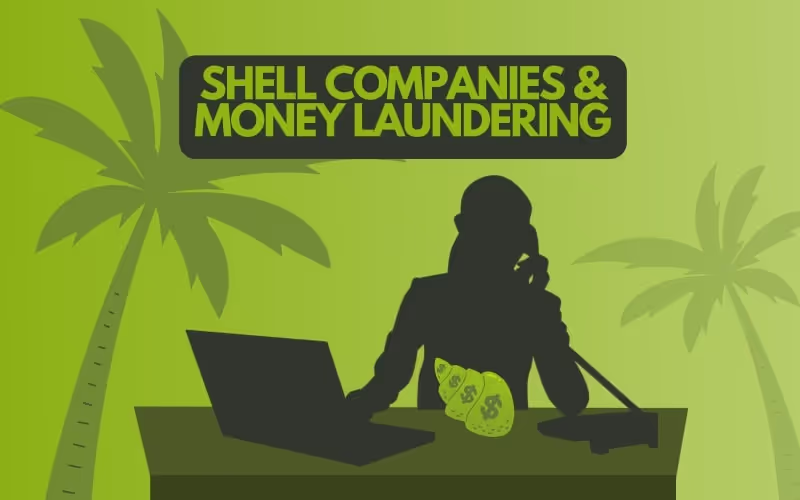
What Is a Shell Company in Money Laundering? A Key Tool for Criminals
A shell company is a legal entity that often hides a business's ultimate beneficial owner (UBO) from investigators, possibly because of money laundering activities. This article reveals real-life examples, why shell companies are so attractive to holders of dirty money - and much more.
What Is a Shell Company?
A shell company, shell corporation, or ghost firm are all the same: Legal entities with no active business operations or significant assets. They are essentially empty (just like the inside of a shell). It's important to remember that these types of firms are not all illegal. After all, there are legitimate reasons to form a shell company, such as for a hostile takeover.
But, curiously, even for legal purposes, the objective often remains the same: To conceal the identities of the ultimate beneficial owners (UBOs). And for money launderers involved in some of the world's most heinous crimes - from the trafficking of fentanyl to kidnapping for ransom - they are an essential tool of the trade.
It's also worth noting that a shell company is not legally different from any other company, such as an LLC in the US. When setting up a ghost firm, there is no 'shell' category box to tick. In the context of money laundering, a shell company cleaning dirty money is, on paper, a regular business but with these characteristics:
- No active business operations
- No significant assets
- Located in a jurisdiction with strict privacy laws
What Is a Shell Company in Money Laundering?
Criminals use shell companies to launder money. But how? Because shell companies in jurisdictions with strict privacy laws provide a legal veil of secrecy that conceals the UBOs that receive financial benefits from the transactions passing through the firm.
These firms are widespread in the layering stage of money laundering. In a nutshell, by directing illicit funds via a shell company (e.g., as genuine-looking invoices), criminals create a dead-end in the money trail.
What's happening in practical terms is this: Shell companies can behave as an identity filter.
For example, when the shell company (controlled by the criminal) transfers illicitly gained funds back to another account in a jurisdiction without strict privacy laws, perhaps where the criminal resides, it will be far more difficult for investigators to follow the money trail to illegal activity.
And that's because the jurisdiction where the shell company exists offers strict privacy laws to its clients. For money launderers, shell companies are part of a strategy to mitigate the risk of investigations leading to their name - meaning they feel comfortable beginning the integration stage of money laundering.
Real-World Examples of Shell Companies Used in Money Laundering
There have been many high-profile cases of money laundering involving shell companies. Here are a few examples:
- Danske Bank scandal (2018): Denmark's largest bank was in a money laundering scandal involving shell companies. Learn more here.
- The 1MDB scandal (2015): Billions of dollars were allegedly stolen from the Malaysian sovereign state fund and laundered through shell companies and offshore bank accounts. Learn more here.
- Panama Papers (2016): The Panama Papers leak in 2016 revealed the extent to which shell companies are used for illicit purposes. Learn more here.
- Pandora Papers (2021): As covered by sanctions.io, the Pandora Papers is a release of nearly 12 million leaked documents revealing the corrupt dealings and money laundering via shell companies of the global elite. Learn more here.
Global Hotspots for Shell Companies and Money Laundering
The famous depiction of a shell company in the public imagination often conjures up the following image: A nondescript law firm situated on a dusty road in a tropical paradise surrounded by swaying palm trees. As you enter, you notice a wall of mailboxes - each one representing a different shell corporation.
Based on the 2016 Panama Papers publication, the Hollywood movie, The Laundromat, has helped proliferate this image. And to a large extent, the stereotype is correct: The most common jurisdictions for shell companies include the British Virgin Islands, the Cayman Islands, Bermuda, and Barbados.
But it's not only the well-known warm-water destinations that money launderers target. It's surprising to many that some US states, such as Wyoming, and countries, like Switzerland, are also known for shell companies with nefarious actors behind them.
Despite their reputation as stable and legitimate financial centers, these jurisdictions also have weak regulatory oversight and strict banking secrecy laws, making them attractive to those seeking to hide their identities and launder money through shell companies.
However, the sands are constantly shifting. For example, from January 1st, 2024, the US Corporate Transparency Act (CTA) will become effective - requiring many US companies to submit beneficial ownership information to Financial Crimes Enforcement Network (FinCEN).
But, of course, money launderers will adapt. And the reality is this: There will always be new global money laundering hotspots.
And what do all the global hotspots for shell companies offer (indirectly) to money launderers? These are the top benefits:
- Strict banking secrecy laws
- Easy and fast incorporation
- Minimal reporting requirements
- Lack of transparency and accountability
- Weak regulatory oversight
- Low or no corporate tax rates
Schemes Used to Launder Money Through Shell Companies
In money laundering, the deeper you delve, the more you realize that the Russian Doll analogy is an accurate one. Within one scheme is another scheme - which itself is home to further schemes.
Criminals set it up this way to mitigate the risk of being a money laundering suspect. And also to make it as hard as possible for investigators to follow the money trail. Here are some of the typical schemes used in cleaning dirty money through shell companies:

Trade-Based Money Laundering
This scheme uses shell companies to create fake invoices for non-existent goods or services. The shell company then pays for the fake invoices using illicit funds.
Round-Tripping
The shell company buys goods or services from a legitimate company. It then sells these goods or services back to the same legitimate company at a higher price (profit). The transaction loop makes it difficult for investigators to trace the source of the funds.
Loan Backs
The shell company lends money to a non-shell regular company. The legitimate company then pays back the loan (with interest) to the shell company. This creates the appearance of legitimate business activity - but in reality, the shell company is laundering dirty money.
Real Estate Transactions
Criminals buy properties under the shell company's name, making it difficult for investigators to trace the source of the funds.
Final Thoughts and How sanctions.io Can Help
Although there are legitimate reasons for forming one, shell companies and money laundering often walk hand-in-hand.
Given that cleaning dirty money is illegal - and is illicit profit from criminal group activity - all companies and organizations should strive to mitigate the risk of money launderers placing transactions through their business (perhaps via a payment made by a shell company a criminal controls).
Services such as sanctions screening, as offered by sanctions.io, can help you with this goal. How? By screening various data sources, individuals and entities that are sanctioned (and possibly involved in money laundering) can be identified. Sanctioned parties are high-risk for money laundering.
You can get to know sanctions.io's service even with basic technology skills - for example, by simply uploading a .csv file with your client and business partner data.
Free 7-Day Trial
We offer a free 7-day trial (no credit card is required) and would also be delighted to walk you through our service and answer all your queries regarding the sanctions.io API, integrations, and more. Book a free Discovery Call now.
sanctions.io is a highly reliable and cost-effective solution for sanction checking. AI-powered and with an enterprise-grade API with 99.99% uptime are reasons why customers globally trust us with their sanctions screening needs.



